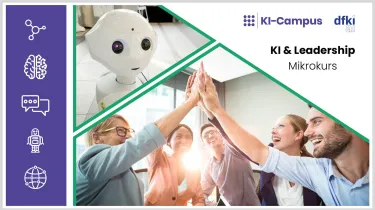AI & Business

Artificial intelligence is already an integral part of many workplaces today. In the future, more and more professions will require the confident use of AI.
AI technologies are also changing the nature and scope of entrepreneurial activities. Social, political and economic aspects must be taken into account. How can AI tools be used successfully in companies? What should be considered when implementing AI projects? Can AI already support us when setting up a company?
At the AI Campus, learn what impact AI has on the world of work and how you can use AI successfully in the work context.
Selected blog posts
News
Identification of applicable AI use cases

Philipp Gerbert is General Managing Director of the TUM Venture Labs (www.tum-venture-labs.de) and board member of appliedAI.
By background Philipp is a physicist, with a Master from LMU Munich/MPI and a PhD from MIT. Later, he worked for McKinsey, the McKenna Group (Silicon Valley) and as Senior Partner for the Boston Consulting Group, focusing on technology-driven businesses. At BCG, he built up AI in Business (and as a hobby: Quantum Computing), as well as Climate Action.

Walter Radermacher was born on 10 June 1952 in Walheim. He studied business administration in Aachen and Münster from 1970 to 1975. After graduating with a degree in business administration, he worked as a research assistant at the University of Münster from 1975 to 1978. At the beginning of 1978, Walter Radermacher joined the Federal Statistical Office. After performing various tasks, he was finally Head of Administration at the Federal Statistical Office from 2001 to mid-2003.
In June 2003, he was assigned the duties of Vice-President on a trial basis, and from 24 December 2003, the function of Vice-President. After Walter Radermacher had been entrusted with deputising for the President from 6 October 2006, he was appointed President on 22 December 2006.
Since 19 January 2007, Walter Radermacher held the office of Federal Election Commissioner. He was appointed Director General of Eurostat with effect from 1 August 2008.

Hi, I’m Ulrich Kerzel and am Professor for Data Science and Artificial Intelligence at IU International University of Applied Sciences, where I am the director of the Master in Artificial Intelligence.
My current research is focused on AI in materials research in cooperation with IMM RWTH Aaachen, helping companies to create value using AI and am part of the research group AI in education at IUBH. Recently, we have started a new project about digitalization in education EduC Kompass Digitale Bildung.

Thomas Zöller teaches as a distance learning professor at IU International University in the Data Science department. His focus is on advanced analytics and artificial intelligence and their key role in digital transformation.
After studying computer science with a minor in mathematics, Zöller received his doctorate from the University of Bonn with a thesis in the field of machine learning in image processing. This was followed by several years of application-oriented research - including at the Fraunhofer Gesellschaft. In his further career, Zöller held various positions with a focus on business intelligence, advanced analytics, analytics strategy and artificial intelligence. In the course of these activities, he was able to gain experience in the defence technology, logistics, retail, finance and automotive sectors.

Dr. Marleen De Smedt, M.D. with specialisation in occupational health, public health and in statistics, is a former official of the European Commission/Eurostat, where she has worked for more than 25 years in various leading positions in the Directorate of social statistics, in particular in the field of public health and well being, and as an advisor for the Director General.

Lara Lusa is an Associate Professor of statistics at the Faculty of Mathematics, Natural Sciences and Information Technologies of University of Primorska (Koper/Capodistria) and at the Medical Faculty of University of Ljubljana, Slovenia. She has many years of research-experience in the field of medical Statistics, in which she also authored numerous publications in the field of virology and recently some on COVID-19-specific topics.

Katharina Schüller studied psychology at the Technical University of Dresden and then earned a degree in statistics at the Ludwig Maximilian University of Munich. In 2003, while still a student, she founded STAT-UP Statistical Consulting & Data Science Services, which she has headed as CEO ever since. The company supports decision-makers in companies as well as politics and administration in building data strategies and data competence as well as developing data applications and models to make data-based decisions with the help of statistics, artificial intelligence and machine learning.
Schüller developed risk modelling software for the Federal Institute for Risk Assessment. This is the prototype of a programme that supports the risk assessor in creating and documenting quantitative risk models.
In 2020, it initiated the development of a Data Literacy Charter under the sponsorship of the Donors' Association for the Promotion of Sciences and Humanities in Germany, which was signed by more than 100 representatives from business, politics and science. In 2021, the IEEE Standards Association appointed her to lead an international working group to develop a global standard for Data & AI Literacy.
Schüller was also involved in the development of the app Stadt, Land, DatenFluss by the German Adult Education Association. This was created to strengthen citizens' data literacy by explaining how new data-based technologies work in a playful way.

Julian studied Mathematics at the University of Augsburg and is currently pursuing a Master’s Degree in Epidemiology at Ludwig-Maximilians-Universität München. He started as an intern in January 2021 and has continued working for STAT-UP as a working student. Before he came to STAT-UP, he worked as a tutor and teaching assistant, and also volunteered as a content creator for an online learning platform.







